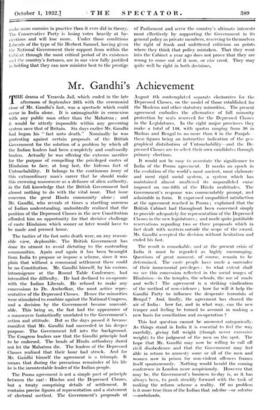Mr. Gandhi's Achievement T HE drama of Yeravda Jail, which ended
in the late afternoon of September 26th with the ceremonial close of Mr. Gandhi's fast, was a spectacle which could occur in India alone. It is unimaginable in connexion with any public man other than the Mahatma ; and it would be utterly impossible within any governing system save that of Britain. Six days earlier Mr. Gandhi had begun his " fast unto death." Nominally he was protesting against certain proposals of the British Government for the solution of a problem by which all the Indian leaders had been c3mpletely and confessedly beaten. Actually he was offering the extreme sacrifice for the purpose of compelling the privileged castes of Hinduism to face, at long last, the hideous fact of Untouchability. It belongs to the continuous irony of this extraordinary man's career that he should make this crowning manoeuvre as a defiance of alien authority, in the full knowledge that the British Government had almost nothing to do with the vital issue. That issue concerns the great Hindu community alone ; and Mr. Gandhi, . who reveals at times a startling sureness of Indian understanding, undoubtedly realized that the position of the Depressed Classes in the new Constitution afforded him an opportunity for that decisive challenge of caste Hinduism which sooner or later would have to • be made and pressed home.
The tactics of the fast unto death were, on any reason- able view, deplorable. The British Government has done its utmost to avoid dictating to the contending communities. Again and again it has been 'besought from India to propose or impose a scheme, since it was plain that without a communal settlement there could be no Constitution. Mr. Gandhi himself, by his curious intransigence at the Round Table • Conference, had intensified the difficulty. He had declined to co-operate with the Indian Liberals. He refused to make any concessions to Dr. Ambedkar, the most active repre- sentative of the Depressed Classes. Hence the minorities were stimulated to combine against the National Congress, and a decision by the Government became unavoid- able. This' being so, the fast had the appearance of a manoeuvre fantastically unrelated to the Government's action and attitude: But as the days passed it became manifest that Mr. Gandhi had • succeeded.. in his deeper purpose. The Government fell into the background. The Congress leaders saw that the Gandhi principle had to be endorsed, The heads of Hindu orthodoxy dared not let the Mahatma die. The leaders of the Depressed Classes realized that their hour had struck. And for Mr. Gaiidhi himself the agreement is a triumph. It means that during the precarious remainder of his life he is the incontestable leader of the Indian people.
The Poona agreement is not a simple pact of principle between the cast Hindus and the Depressed- Classes, but a treaty comprising details Of settlement. It contains precise figures of representation and a statement of electoral method. The Government's proposals of August 4th contemplated separate electorates for the Depressed Classes, on the model of those established for the Moslems and other statutory minorities. The present agreement embodies the alternative of full minority protection by seats reserved for the Depressed Classes in the Legislatures. In the eight major provinces they make a total of 148, with quotas ranging from 30 in Madras and Bengal to no more than 8 in the Punjab— these figures being an instructive indication of the geo- graphical distribution of Untouchability—and the De- pressed Classes are to select their own candidates through primary elections.
It would not be easy to overstate the significance to India of the Poona agreement. It marks an epoch in the evolution of the world's most ancient, most elaborate and most rigid social system, a system which has maintained almost unaltered its unparalleled curse imposed on one-fifth of the Hindu multitudes. The Government's response was commendably prompt, and admirable in form. It expressed unqualified satisfaction at the agreement reached in Poona ; explained that the British Cabinet had throughout been concerned simply to provide adequately for representation of the Depressed Classes in the new legislatures ; and made quite justifiable reservations regarding two or three proposals which in fact dealt with matters outside the scope of the award. Mr. Gandhi accepted the decision without hesitation and ended his fast.
The result is remarkable, and at the present crisis of India it must be regarded as highly encouraging. Questions of great moment, of course, remain to be determined. The caste people have made a surrender of their immemorial privileges : to what extent shall we see this concession reflected in the social usages of Hinduism—in the temples, the schools, the use of roads and wells ? The agreement is a striking vindication of the method of non-violence ; how far will it help the Gandhi Party to influence the desperate terrorists of Bengal ? And, finally, the agreement has cleared the air of India : how far, and in what way, can the new temper and feeling be turned to account in making a new basis for conciliation and co-operation ?
This last question cannot be answered categorically. As things stand in India it is essential to feel the way carefully, giving full weight (though never excessive weight) to the judgment of the men on the spot. The hope that Mr. Gandhi may now be willing to call off civil disobedience and that the Government may feel able in return to amnesty some or all of the men and Women now in prison for non-violent offences frames itself spontaneously. Nothing would herald the coming conference in London more auspiciously. However that may be, the Government's business to-day is, as it has always been, to pdsh steadily- forward with the task of making the reform scheme a reality. Of no problem is it more true than of the Indian that soh:aut.—ter eolvetur —ambulated°.














































 Previous page
Previous page